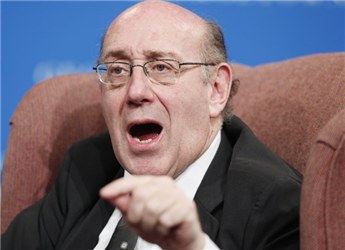Seizing Justice

New oil-spill compensation czar Kenneth Feinberg controls a $20 billion victims’ fund that represents yet another power-grab by the White House...
Energy: The administration strong-armed BP into placing billions into a fund that is supposed to compensate Gulf oil-spill victims. Nothing wrong with making victims whole, but isn't that what courts are for?
During the BP executives' brief meeting Wednesday with President Obama, they agreed to set aside $20 billion into an escrow account that will be used to pay for damage to businesses and individuals caused by the Deepwater Horizon oil spill. The funds are to be distributed by a third party who supposedly will be nonbiased.
That party is Kenneth Feinberg, last seen serving as the administration's pay czar. And that smell in the Gulf? It isn't the sulfurous odor of spilled crude. Just the rancid stench of politics.
Setting up the office of a pay czar, officially known as "special master for compensation," was another of this administration's many violations of the private sector. The position was established to oversee executive pay at companies that took bailouts.
But the zealous Feinberg, who demanded that Bank of America CEO Ken Lewis work for free, seemed ready at any time to increase the office's authority and begin dictating corporate salaries beyond those in the bailed-out companies.
As pay czar, Feinberg, a one-time chief of staff for the late Sen. Ted Kennedy who was recommended to Obama for his pay-czar gig by Democratic Sen. Chris Dodd of Connecticut, felt it was his duty to send a message to Wall Street. It's a line of thinking perfectly in sync with this administration's eagerness to impose government authority over the private sector.
The president might be confident that Feinberg "will assure that claims are administered as quickly, as fairly and as transparently as possible." But we're not. The job shouldn't be a forum for expressing populist outrage toward the vilified oil industry. Nor is it supposed to be a mechanism for handing out political favors.
The only fair way to handle the compensation process is through the judicial system. Our civil courts were designed to settle disputes between private citizens and compensate victims of harm.
The courts have, until they were hijacked by predatory lawyers from the trial bar, generally performed their duty well.
For all its (compelled) generosity, BP might yet find itself tangled in this system. Under the terms of the agreement, the fund does not "supersede either individuals' rights or states' rights" to sue in court, leaving the company exposed to the civil liability version of double jeopardy.
It's not far-fetched at all to interpret this exception as both a political play and a clear message to the trial lawyers who are eyeing energy as the next industry to get rich from.
The administration has also emphasized that the $20 billion amount is not a cap. This strongly suggests the White House isn't finished plundering BP and its shareholders.
We understand that, in our litigation system, the wheels of justice often roll on as if the tires were flat — or worse, square. But it is our system and it guards against the executive branch trying to establish justice as a monarch would, by fiat and political favors. It should not be bypassed for convenience or political gain.
Texas Republican Rep. Joe Barton is right to characterize the $20 billion fund a "shakedown," just as GOP Rep. Michele Bachmann of Minnesota is correct in calling it a "redistribution-of-wealth fund" and a "gateway for more government control."
This White House is treading yet again on ground that it should stay
away from. That the infringement has gone this far is a regret. If it
goes any further, it will be a tragedy.